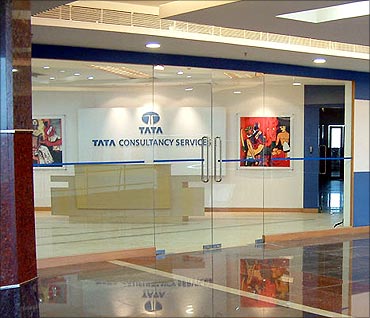Top software exporter Tata Consultancy Services surpassed Reliance Industries on the last trading day of the year to become the country's most-valuable firm, capping a gloomy year for shareholders of the energy major controlled by India's richest man Mukesh Ambani.
Reliance, for long the darling of Indian investors, was briefly knocked off its four-year long perch as the country's most-valuable company in August -- first by state-run Coal India and then by Oil & Natural Gas Corp -- before regaining it.
TCS, part of the salt-to-software Tata conglomerate, is the first private-sector company to overtake Reliance in market value.
Shares in Reliance, which owns the world's largest refinery complex, fell 2.7 percent on Friday to their lowest level since March 2009. The stock lost 34.5 percent in 2011, underperforming a 24.6 percent fall in the benchmark index.
At Friday's close, Reliance was valued at about $42.7 billion, while TCS commanded a market value of $42.8 billion, despite its shares closing 0.4 percent lower.
"This leadership game is becoming like a musical chair," said Jagannadham Thunuguntla, head of research at SMC Global securities in New Delhi.
"If the underperformance in Reliance shares continues, it will become difficult for them to regain the top position again."
Reliance's growth outlook has been marred by falling gas output from its huge KG D6 gas fields, off India's east coast, which has drawn criticism from the country's upstream regulator, investors and analysts.
A $7.2 billion deal to sell a 30 percent stake in 23 oil and gas blocks to BP Plc struck earlier this year failed to impress shareholders, who are also looking for more clarity on the company's move to enter new areas such as retail and telecoms.
"KG D6 has sort of become a drag," Thunuguntla said. "And also, they have somehow got into a long-gestation trap in all their businesses -- be it oil and gas, retail or telecom."
"They are sitting on a huge cash pile and need to deploy it at the right place. Holding cash is again not good," he said.
TCS, which competes with companies such as Infosys Ltd and Wipro in providing software services to western clients, saw its share price jump nearly 12 percent in the December quarter, compared with a 6 percent drop in the benchmark index. TCS has shed 0.4 percent on the year.
Global technology spending outlook remains uncertain with no easy fix seen to the euro zone sovereign debt crisis and concerns about the U.S. economy, but a sharp fall in the Indian rupee helps these exporters who get most of their revenues in foreign currencies while bulk of their spends are in rupee.
Reliance, for long the darling of Indian investors, was briefly knocked off its four-year long perch as the country's most-valuable company in August -- first by state-run Coal India and then by Oil & Natural Gas Corp -- before regaining it.
TCS, part of the salt-to-software Tata conglomerate, is the first private-sector company to overtake Reliance in market value.
Shares in Reliance, which owns the world's largest refinery complex, fell 2.7 percent on Friday to their lowest level since March 2009. The stock lost 34.5 percent in 2011, underperforming a 24.6 percent fall in the benchmark index.
At Friday's close, Reliance was valued at about $42.7 billion, while TCS commanded a market value of $42.8 billion, despite its shares closing 0.4 percent lower.
"This leadership game is becoming like a musical chair," said Jagannadham Thunuguntla, head of research at SMC Global securities in New Delhi.
"If the underperformance in Reliance shares continues, it will become difficult for them to regain the top position again."
Reliance's growth outlook has been marred by falling gas output from its huge KG D6 gas fields, off India's east coast, which has drawn criticism from the country's upstream regulator, investors and analysts.
A $7.2 billion deal to sell a 30 percent stake in 23 oil and gas blocks to BP Plc struck earlier this year failed to impress shareholders, who are also looking for more clarity on the company's move to enter new areas such as retail and telecoms.
"KG D6 has sort of become a drag," Thunuguntla said. "And also, they have somehow got into a long-gestation trap in all their businesses -- be it oil and gas, retail or telecom."
"They are sitting on a huge cash pile and need to deploy it at the right place. Holding cash is again not good," he said.
TCS, which competes with companies such as Infosys Ltd and Wipro in providing software services to western clients, saw its share price jump nearly 12 percent in the December quarter, compared with a 6 percent drop in the benchmark index. TCS has shed 0.4 percent on the year.
Global technology spending outlook remains uncertain with no easy fix seen to the euro zone sovereign debt crisis and concerns about the U.S. economy, but a sharp fall in the Indian rupee helps these exporters who get most of their revenues in foreign currencies while bulk of their spends are in rupee.

No comments:
Post a Comment